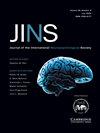Social cognition and healthy aging: Cross-sectional associations of emotion perception, theory of mind, and emotional empathy
IF 2.6
4区 心理学
Q2 CLINICAL NEUROLOGY
Journal of the International Neuropsychological Society
Pub Date : 2024-09-19
DOI:10.1017/s135561772400033x
引用次数: 0
Abstract
Objective: Older adults are identified to have reduced social cognitive performance compared to younger adults. However, few studies have examined age-associations throughout later life to determine whether these reductions continue with advancing age. Method: This study assesses cross-sectional associations of emotion perception, cognitive and affective theory of mind (ToM), and emotional empathy in a healthy sample of 157 adults aged 50–89 years (社会认知与健康老龄化:情绪感知、心智理论和情感共鸣的横断面关联
目的与年轻人相比,老年人的社会认知能力有所下降。然而,很少有研究对整个晚年生活中的年龄关联进行研究,以确定这些降低是否会随着年龄的增长而持续。研究方法本研究评估了 157 名年龄在 50-89 岁之间的健康成年人(男 = 65.31,女 = 9.00,女性占 68%)在情绪感知、认知和情感心智理论(ToM)以及情感共鸣方面的横断面关联。情绪感知、认知心智图式和情感心智图式采用社会推理意识测验简表(TASIT-S)进行测量,情感心智图式则采用 "读心术修订版"(RME-R)进行测量。情感移情使用移情商数进行测量。研究结果经多重比较调整后进行的多元回归分析表明,年龄与情绪感知之间存在中度负相关,包括所有情绪,以及悲伤和反感的表情,但不包括快乐、中性、焦虑或愤怒的表情。年龄与使用 TASIT-S 测量的一阶认知、二阶认知和情感 ToM 呈中度负相关,但与 RME-R 无关。年龄与情感移情没有明显关联。结论这项研究有助于加深人们对晚年社会认知表现与年龄相关性的有限了解。这些知识可为今后的研究提供参考,以探讨将社会认知测量纳入神经心理学筛查和晚年神经系统疾病诊断工具的临床实用性。
本文章由计算机程序翻译,如有差异,请以英文原文为准。
求助全文
约1分钟内获得全文
求助全文
来源期刊
CiteScore
5.40
自引率
3.80%
发文量
185
审稿时长
4-8 weeks
期刊介绍:
The Journal of the International Neuropsychological Society is the official journal of the International Neuropsychological Society, an organization of over 4,500 international members from a variety of disciplines. The Journal of the International Neuropsychological Society welcomes original, creative, high quality research papers covering all areas of neuropsychology. The focus of articles may be primarily experimental, applied, or clinical. Contributions will broadly reflect the interest of all areas of neuropsychology, including but not limited to: development of cognitive processes, brain-behavior relationships, adult and pediatric neuropsychology, neurobehavioral syndromes (such as aphasia or apraxia), and the interfaces of neuropsychology with related areas such as behavioral neurology, neuropsychiatry, genetics, and cognitive neuroscience. Papers that utilize behavioral, neuroimaging, and electrophysiological measures are appropriate.
To assure maximum flexibility and to promote diverse mechanisms of scholarly communication, the following formats are available in addition to a Regular Research Article: Brief Communication is a shorter research article; Rapid Communication is intended for "fast breaking" new work that does not yet justify a full length article and is placed on a fast review track; Case Report is a theoretically important and unique case study; Critical Review and Short Review are thoughtful considerations of topics of importance to neuropsychology and include meta-analyses; Dialogue provides a forum for publishing two distinct positions on controversial issues in a point-counterpoint format; Special Issue and Special Section consist of several articles linked thematically; Letter to the Editor responds to recent articles published in the Journal of the International Neuropsychological Society; and Book Review, which is considered but is no longer solicited.

 求助内容:
求助内容: 应助结果提醒方式:
应助结果提醒方式:


